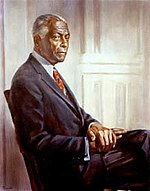Benjamin Mays, Date of Birth, Place of Birth, Date of Death
TweetBenjamin Mays
American educator, activist, minister
 Date of Birth: 01-Aug-1894
Date of Birth: 01-Aug-1894
 Place of Birth: South Carolina, United States
Place of Birth: South Carolina, United States
Date of Death: 28-Mar-1984
Profession: writer, pastor
Nationality: United States
Zodiac Sign: Leo 
About Benjamin Mays
- Benjamin Elijah Mays (August 1, 1894 – March 28, 1984) was an American Baptist minister and civil rights leader who is credited with laying the intellectual foundations of the Civil Rights Movement.
- Mays taught and mentored many influential activists: Martin Luther King Jr, Julian Bond, Maynard Jackson, and Donn Clendenon, among others.
- His rhetoric and intellectual work focused on notions of nonviolence and civil resistance–beliefs inspired by the teachings of Mahatma Gandhi.
- The peak of his public influence occurred during his almost thirty years as the 6th President of Morehouse College, a historically black institution of higher learning. Mays was born in the Jim Crow South on a repurposed cotton plantation to freed sharecroppers.
- He traveled North to attend Bates College and the University of Chicago from where he began his career in activism as a pastor in the Shiloh Baptist Church in Atlanta, Georgia.
- After a brief career as a professor, he was appointed as the Dean of the School of Religion at Howard University in 1934 which elevated him to national prominence as a proponent of the New Negro movement.
- Six years later, Mays was elected as the president of Morehouse College, an at-the-time financially unstable enterprise.
- Over his tenure from 1940 to 1967, the college's financial endowment was doubled and enrollment quadrupled; it was established as a leading liberal arts college in the United States. Due to the relative smallness of the college, Mays mentored and taught many students, most notably King.
- His connection with King spanned his early days at the college in 1944.
- King was known as Mays' "spiritual son" and Mays his "intellectual father." After King's famous "I Have A Dream" speech at the March on Washington for Jobs and Freedom on August 28, 1963, Mays gave the benediction.
- Upon the 1968 death of King, he was asked to give the eulogy where he described him in his "No Man is Ahead of His Time" speech.
- Mays stepped down from the presidency in 1967 continuing to work as a leader in the African American community.
- He presided over the Atlanta Board of Education from 1969 to 1978, where he initiated the desegregation of Atlanta. Mays' contributions to the civil rights movement have had him hailed as the "movement's intellectual conscience" or alternatively the "Dean [or Schoolmaster] of the Movement".
- Historian Lawrence Carter described Mays as "one of the most significant figures in American history".
- Hundreds of streets, buildings, statues, awards, scholarships, grants, and fellowships are named in his honor.
- Numerous efforts have been brought forward to posthumously award Mays the Presidential Medal of Freedom as well as feature him on a U.S.
- postage stamp.
Read more at Wikipedia
See Also
- Famous People's Birthdays on 01 August, United States
- Famous People's Birthdays in August, United States
- Famous writer's Birthdays on 01 August, United States
- Famous writer's Birthdays in August, United States
- Famous pastor's Birthdays on 01 August, United States
- Famous pastor's Birthdays in August, United States

